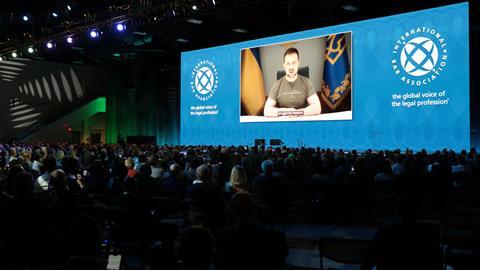Ukraine president Volodymyr Zelensky has told lawyers that they can play a crucial role in ending the war with Russia. Addressing the International Bar Association conference in Miami by video link, Zelensky said the law can bring closure on the conflict once fighting ends.
Every war crime committed by Russian forces will be investigated and perpetrators brought to justice, he said. ‘I would like to draw attention to the fact that lawyers will put an end to this war after the military, after the politicians,’ said the president. ‘Lawyers will ensure that all those guilty of terror are brought to justice and that all damages caused by Russia are compensated at the expense of the assets of the aggressor state itself. It is this kind of justice that should be the end of the evil that Russia has brought.’
Millions of people have been displaced and several cities destroyed by missile and bomb attacks following Russia's invasion in February.
Zelensky said Ukraine is already cooperating with law enforcement in the US and the International Criminal Court to bring perpetrators of war crimes to account. The country has also created the Special Compensation Mechanism, which will ensure the confiscation and channeling of Russian assets to compensate for losses caused by the war.
‘This is a chance for all of us to establish the force of international law,’ added Zelensky.
A separate IBA event on how to rebuild Ukraine heard that international law-enforcers are now dealing with more than 30,000 incidents of alleged war crimes which have been documented and recorded.
International criminal law expert Mark Ellis, IBA executive director, said there was now an unprecedented focus on accountability for what is happening in Ukraine.
But he said legitimate concerns remain about how cases can be prosecuted, particularly over whether the international community is in agreement on how and whether to prosecute certain individuals. Ellis also downplayed expectations that the International Criminal Court would play a central role in prosecutions, suggesting instead that most cases should be heard in Ukraine itself.
Ellis added: ‘It is sometimes a bit of a misconception in the international community to look to the ICC as the instrument for bringing to justice all those who have committed a crime. The ICC was created as a complement, and first and foremost cases should be the [role of] the domestic legal community.’
This article is now closed for comment.
































8 Readers' comments